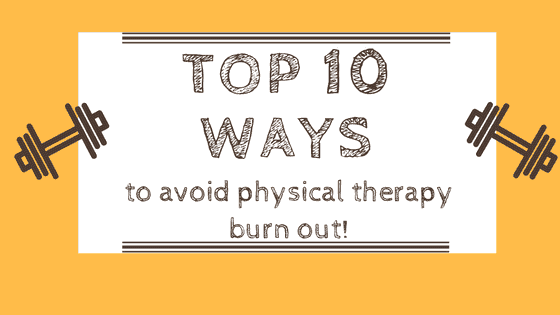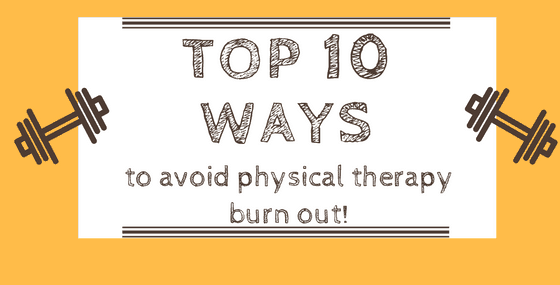Top 10 Ways To Avoid Physical Therapy Burnout
by DebtFreeEmma | Oct 28, 2017 |

Top 10 Ways To Avoid Physical Therapy Burnout

The conversation about physical therapy burnout is spreading like wildfire amongst the blogs and media sites. Despite physical therapy being often ranked amongst the top 10 medical careers and often in the top 20 of general careers for new graduates, physical therapy is also a career which can lead to burnout.
Top Reasons Physical Therapists Burn Out
-
Too high of productivity demands: With decreasing or stagnant insurance reimbursements, many clinic’s are pushing for therapists to see more clients at once or more clients in one day. This leads to high stress as therapists are often pushed toward questionable ethics in their treatment and hours of unpaid documentation.
-
Less 1-1 time with patients: Many therapists became PT’s to help people. Good physical therapy treatment sessions, however, require time with the patient. But with caseloads growing out of control, many clinics have had to cut their one on one treatment time, often sending patients to complete their exercises with a less skilled PTA or aide.
-
Lack of upward growth: Finding managerial positions or senior physical therapist positions are rare and often require previous managerial experience and at least 5 years of PT experience.
-
Lack of proper compensation: Physical therapists are commonly required to complete 3 years of graduate school (some are changing to more accelerated programs but 3 years is the average currently). According to an article by the APTA written in 2017, the average physical therapist student loan debt is $83,000 and total average debt (accumulating from undergraduate and credit cards…) was $96,000. Now I believe that the average debt is even higher than this. My current loan debt is almost $200,000. This loan amount is crazy in comparison to the average salaries many therapists make: roughly $70,000. I have been a PT for 3 years, and many starting offer’s and even offer’s after one year of experience were in the $65,000 range -and I was living in Los Angeles and New Jersey at the time! Those are two very expensive cost of living areas! By comparison, many pharmacist, nurse practitioners, physician assistants are making starting salaries in the $100,000 range and they require only 1 year more of schooling generally. To make matters worse, there is little evidence of increased pay as a physical therapist if you complete a residency, your specialist certification, or any other certifications!
Top 10 Things To Do To Avoid Physical Therapy Burnout
Physical therapy can be a great career. PT’s help people on a personal level and often see results in the same session. PT’s can help change people’s lives. However, therapists should not have to sacrifice their quality of life in order to be successful in this profession.
These are the top 10 things YOU can DO to avoid therapy burnout:
-
ENSURE PROPER WORK STANDARDS: Find a clinic that prides themselves on quality of care and compassion not just for their patients but also for their employees. Look for jobs that provide hour long or at least 45 min evaluation and treatment sessions.
-
DISCUSS GROWTH OPPORTUNITIES UPFRONT: If growing your career and your knowledge base is important, let your manager know. I think it is important to discuss how your growth could then translate into even more growth for the clinic. Highlight the Win-Win scenario. For example, highlight that you have an interest in starting a sports performance class. The clinic manager may be persuaded to reimburse you for continuing education and even increase your pay if the program goes well. In exchange, the clinic gets new clients!
-
FIND POSITIONS THAT PROVIDE LOAN REIMBURSEMENT OR FORGIVENESS PROGRAMS: Non profit schools, non profit hospitals, the Veteran’s Health Administration, non profit teaching or research institutions are just some examples of work places that could help reduce the mental stress of student loans. Although you may be sacrificing wages, depending on your loan amounts-these work places may save you thousands of dollars and also save you the mental anguish of trying to figure out how to pay off your loans.
-
CHOOSE A LOW COST PHYSICAL THERAPY PROGRAM TO MINIMIZE DEBT: There is growing evidence that many physical therapists are choosing where they work based on salary, not on their desired setting or desired work life balance. It is likely true that many high paying jobs will expect higher productivity and provide a reduced work-life balance. In order to reduce the risk of choosing your job based on money instead of other factors important to you, you should try to reduce your student loan burden. Look for lower priced schools, scholarships, or try to negotiate a contract with a current PT clinic. If there is a clinic you strongly desire to work for, I suggest calling them and trying to arrange an agreement where they pay for your school in exchange for working at that location for a reduced salary. I know several therapists who had contracts before entering PT school, and it really helped in 2 ways: 1) they had no stress over finding a job, they already had locked one down! and 2) they no debt or minimal debt as the company was helping to pay their way! This actually how many MBA students also pay for their graduate school. Negotiating these contracts is often easier when you are already working in the company in such fashion, such a volunteer or an aide.
-
CHOOSE A PT CAREER WITH FLEXIBILITY: Traveling physical therapy was one of the best choices of my life! Traveling PT allowed me to make between $1500 and $1700 a week, after taxes ! In addition, it provided standard benefits like healthcare, 401K, and they even reimbursed me for my licensure and CPR re-certification. Oh, it also paid to fly me to my job and reimbursed me for my housing! Thats just the financial benefits. As a traveling physical therapist, I was able to learn so many more skills and see more settings than if I would have worked in a traditional setting. In just 2 years, I was able to work in a skilled nursing facility, acute care, and acute rehabilitation. Through traveling PT, I added being a lead physical therapist on a level 1 trauma center orthopedic floor, improved my ability to treat patients status post amputation, and allowed me to figure out what setting was truly my passion. This career path also enabled me to find confidence in handling almost any situation but at the same time humbled me to be able to ask more questions. To learn more about traveling physical therapy and how to get started go to:
-
FIND A CORE GROUP OF MENTORS/FRIENDS: I know this is a little cheesy, but being an adult is hard. And being an adult with $200,000 in student loan debt is even harder! Your friends, family, fellow clinicians may have ideas to help you overcome this crazy time in your life. This is exactly why I created DEBT FREE PHYSICAL THERAPY Facebook Group and debtfreept.com! I wanted to show my ideas to fellow classmates and future PT’s to help them save thousands of dollars and really live their lives again.
-
ADVANCE YOUR CARRER: Get your MBA (Masters in Business Administration) or MPH/A (Masters in Public Health or Administration): Sometimes, work experience can only get you so far in your career. Luckily, online colleges are becoming very popular and enable one to work full time as a physical therapist while also getting their MBA or MPH online! This additional degree may allow you to become a health care administrator or chief physical therapist. Some businesses will even pay you to get further education! One example is Aureus Medical, a traveling healthcare company, that will provide tuition reimbursement for education! To read more about this, you can get my ebook:
-
CHOOSE A NON CLINICAL POSITION: Physical therapists are on their feet for long hours. They are also having to do very manual work, such as massage, bend or lift heavy limbs, and perform difficult transfers. They also have to be very upbeat and social. All these demands can take a toll and cause some one to burn out of this profession. Thats OK!!!! There are many great things that you can still do with your physical therapy career and help people without being in a clinical position! Some ideas could be to become a therapy professor or faculty member, go into research, become a insurance auditor, become a consultant, become a clinic owner, become a gym/yoga/pilates/MMA studio owner, become a personal trainer, become a clinical education instructor…..How to choose whats next? First, think of some of the positives you enjoy from being a physical therapist. Then, think of what stresses you and what are the negatives that affect you as a physical therapist. Try to find positions that you can use your skills but that avoid those stressors.
-
WORK PART TIME OR PER DEIM: I love being a physical therapist during Christmas time! I always wondered why but after several years, I have figured out that its because I end up working only several days in the week! PT’s have such a rigorous day (other career’s do too, but I’m just focusing on PT for this blog) and its really hard to recharge after only 2 days with all of life’s stressors. Sometimes working part time is the easiest solution. You will be able to earn income, help people, still use your license. But, you wont have as much stress and you will get more days to recharge. This is also true for per diem workers. Many part time or per diem workers can negotiate higher wages, and if you have children, working part time may be even be more cost saving than day care!
-
TAKE VACATIONS! After working full time (actually full time plus over time and a per diem position) for 2 years, I was beginning to feel burnt out as physical therapist. Like many new graduates, I had felt the pressure to try to expand my career and prove myself. I also had felt the pressure to make as much money as possible, while simultaneously not spend any money either! But after 2 years of this “all work and no play” mentality, I literally was going crazy. I was becoming resentful of my profession and the others around me. It affected my family and friend relationships. I really have my boyfriend to thank for pulling me out of my funk. He said this ” In 10 years, is that $200 trip going to matter? Is that $40 dinner going to matter?” ….How about after 20 years? As emerging physical therapists, we all want to get to that finish line called “being debt free!” but at what cost? I think just as being thrifty is important, so is indulging and living life! We only get one chance anyways! So take a couple days off and just sit at home and relax. Take a couple of 3 day weeks and go on a little day trip. When I’m fifty, will I remember rock climbing in Utah or will I remember working an extra 2 days?
Summary
In summary, physical therapy is a great profession. But not all jobs and not all clinics are made equal. So find a clinic that treats you right; find a clinic that appreciates your talents and provides you proper compensation with room to grow your experience. You may not find this job right away and thats ok! I have had 5 different jobs (3 as a traveler) and each job was very different. Along the way, remember to let yourself have some fun and don’t be afraid to ask your friends and family for help. I hope this helps you become a better and happy physical therapist!
Looking for different careers as a physical therapist?
TRAVEL HEALTHCARE BASICS:










